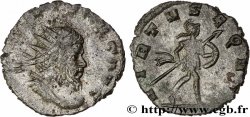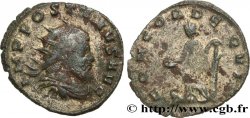brm_312913 - AUREOLUS Antoninien
Not available.
Item sold on our e-shop (2014)
Price : 280.00 €
Item sold on our e-shop (2014)
Price : 280.00 €
Type : Antoninien
Date: 268
Mint name / Town : Milan
Metal : billon
Millesimal fineness : 20 ‰
Diameter : 20 mm
Orientation dies : 12 h.
Weight : 3,19 g.
Rarity : R2
Officine: 3e
Coments on the condition:
Magnifique exemplaire idéalement centré sur un flan ovale. Portrait de toute beauté. Joli revers de style particulièrement fin. Patine grise aux reflets métalliques
Catalogue references :
Obverse
Obverse legend : IMP C POSTVMVS P F AVG.
Obverse description : Buste radié, drapé et cuirassé de Postume à droite, vu de trois quarts en avant (A).
Obverse translation : “Imperator Cæsar Postumus Pius Felix Augustus”, (L’empereur césar Postume pieux heureux auguste).
Reverse
Reverse legend : PAX - EQV-ITVM/ -|-// T.
Reverse description : Pax (la Paix) debout à gauche, tenant une branche d’olivier de la main droite et un sceptre transversal de la main gauche.
Reverse translation : “Pax Equitum”, (La Paix de la cavalerie).
Commentary
Avec son argenture superficielle. Rubans de type 3. Ptéryges très fines sous le paludamentum. Jean-Marc Doyen dans son étude sur Milan avait recensé vingt-deux antoniniens avec dix-neuf coins de droit et dix-huit coins de revers pour les pièces sans ponctuation. Césure inhabituelle au revers.








 Report a mistake
Report a mistake Print the page
Print the page Share my selection
Share my selection Ask a question
Ask a question Consign / sell
Consign / sell
 Full data
Full data



